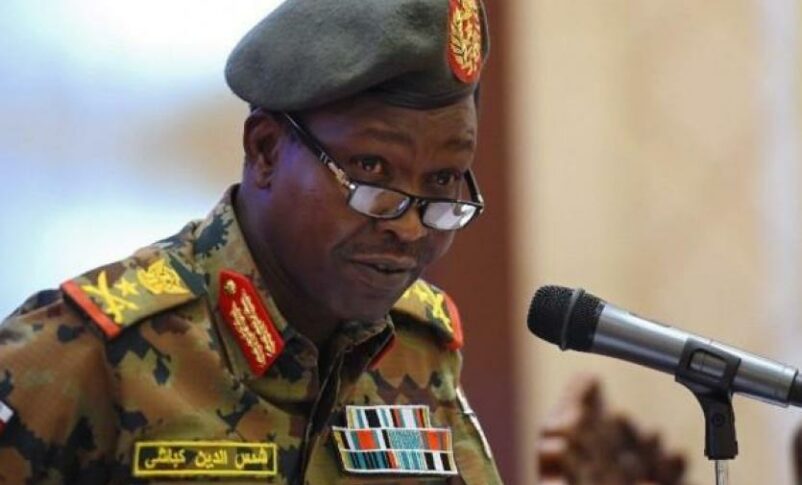Sudan’s army says committed to initiatives to end war, establish civilian government
July 15, 2023 (KHARTOUM) – Shams al-Din Kabbashi, a member of the Sovereignty Council and Deputy Commander-in-Chief of the Sudanese Army, expressed on Saturday the military leadership’s commitment to initiatives aimed at ending the war in Sudan and establishing a civilian government.
These statements align with the announcement of the return of the warring parties’ delegations to Jeddah to resume negotiations sponsored by the United States and Saudi Arabia. This comes after the military leadership rejected the initiatives the African Union and IGAD put forth to halt the conflict.
In an interview with Al-Jazeera channel, Kabbashi stated on Saturday that they are “open to any serious initiative that can bring an end to the war while safeguarding national sovereignty and state institutions,” emphasizing the advancement of the Saudi-American initiative.
When discussing their vision for a political solution in Sudan, he explained their principled stance, stating that they support an “inclusive and comprehensive political dialogue that leads to a civilian government overseeing the transitional phase and paves the way for free and fair elections, ultimately establishing a democratic system.
On December 5, 2022, the Sudanese army and the Rapid Support Forces (RSF) reached an agreement with various political factions, notably the Forces for Freedom and Change (FFC), which aimed to restore civil governance institutions and remove the military from politics. However, due to significant disagreements arising from the integration process of the paramilitary forces, the final agreement was not signed, leading to the conflict on April 15.
Kabbashi emphasized the need for national efforts and external support to rebuild what has been devastated by the war.
Expressing gratitude for the armed forces’ efforts, the military leader further underscored that the army will remain a steadfast shield against any conspiracies.
In the third month of the conflict in Khartoum, the Sudanese infantry forces launched military attacks against the RSF with the objective of regaining control over the sites they occupy and residential neighbourhoods.
The military-led government also welcomed the initiative of the neighbouring countries while reiterating its rejection of the IGAD initiative. Khartoum accuses the Kenyan president of lacking neutrality.
After the eruption of the war, the army leaders openly criticize the FFC and call for forming an inclusive national government encompassing various political forces.
Kabbashi’s statement was welcomed by the FFC political leaders who call to stop the war and hold political dialogue to reach a compromise on the RSF integration and the restoration of a transitional civilian government.
Al-Burhan insists on RSF removal
The leader of the Sovereign Council, Abdel Fattah al-Burhan, reframed the statement of his deputy military leader and reaffirmed his demand to remove the RSF from Khartoum as a prerequisite for halting the hostilities.
According to a statement released by the Sovereignty Council, Al-Burhan conveyed to Kenyan President William Ruto his rejection of the IGAD Quartet’s proposals, which included deploying East African forces without Sudan’s consent.
He also reiterated his stance on the RSF rebels vacating civilian residences, water, electricity, energy facilities, and government buildings.
Ruto reached out to Al-Burhan on Saturday to persuade him to cooperate with the IGAD Quartet, which has been tasked with resolving the conflict in Sudan.
Hemetti’s liaison committee
In a related development, Mohamed Hamdan Daglo “Hemetti”, the commander of the Rapid Support Forces, announced on Saturday evening the formation of a committee to engage with political, social, and armed groups.
In a statement released late on Saturday, Hemetti underscored the need for dialogue to achieve a comprehensive political resolution requiring extensive consultations to address the underlying national crisis.
The committee’s chairmanship has been entrusted to Youssef Ezzat, his political advisor, with Lana Mahdi, Bella Mohamed, and Fatima Ali serving as members.
The committee is tasked with exploring the most effective approach to achieving a comprehensive solution that addresses the crisis’s root causes, with the participation of all political, youth, and societal forces.
(ST)

